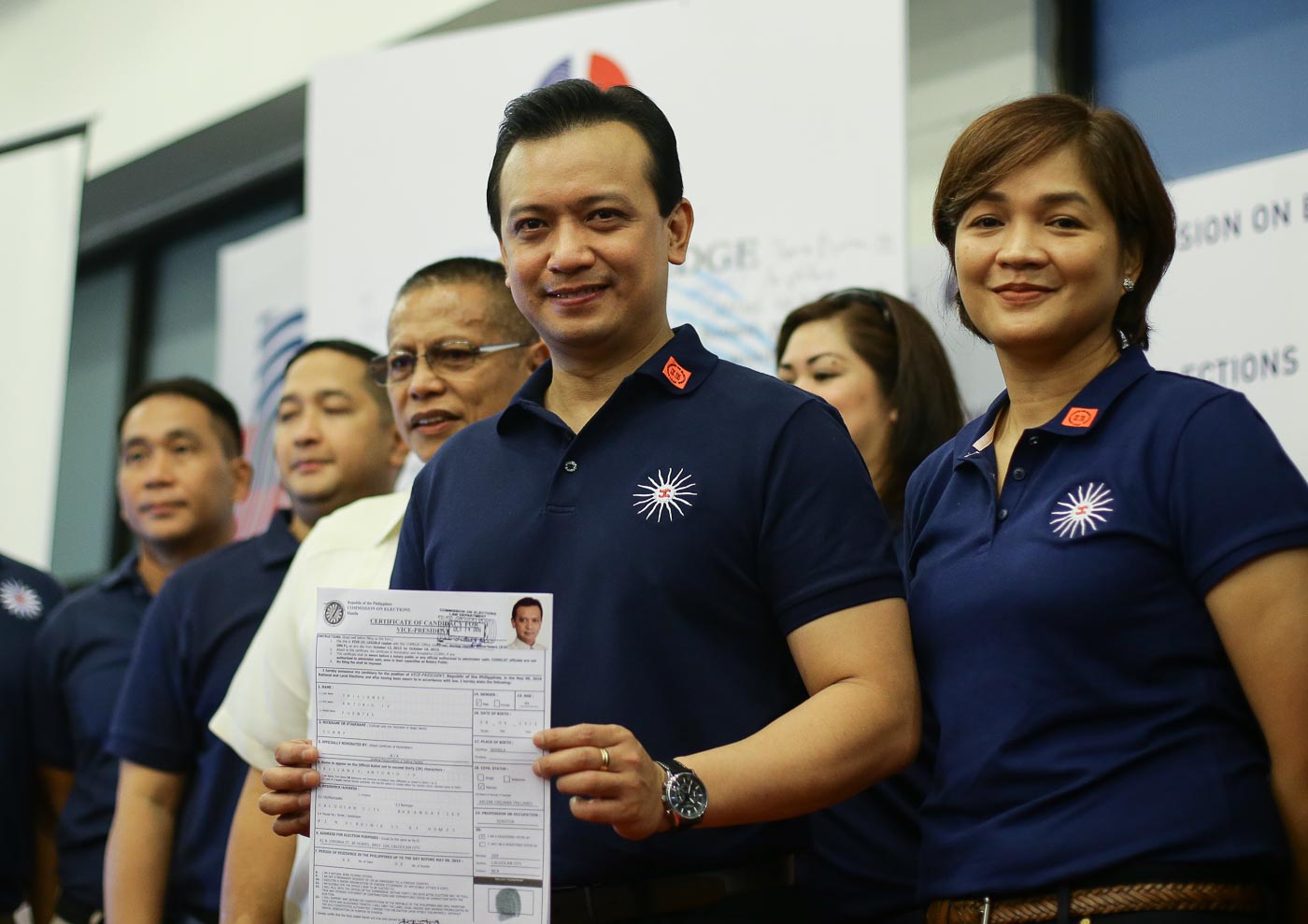
MANILA, Philippines – He hasn’t given up the fight.
Senator Antonio Trillanes IV harked back to the Oakwood mutiny he staged with other military officers in 2003 as the beginning of his fight against corruption. He’s taking the fight even further as he guns for the vice presidency in the 2016 elections.
The 44-year-old naval officer-turned-lawmaker says he will continue his reformist agenda if elected to the post. He has many accolades under his belt, including 47 principally-authored or co-authored bills passed into laws and numerous medals as a military officer.
He is running as an independent candidate, with support from the Samahang Magdalo, a 500,000-strong socio-civic group that traces its roots to the Oakwood mutiny. But he supports the presidential bid of Senator Grace Poe.
Though a close ally of President Benigno Aquino III, Trillanes has taken positions on key issues that are not necessarily the same as the Chief Executive's. (READ: 8 things to know about Antonio Trillanes IV)
As part of Rappler’s #PHVote “The Leader I Want Series,” we look at Trillanes’ stand on issues the next vice president will have to face: corruption, social inequality, climate change and disasters, foreign policy, overseas Filipino workers, and peace in Mindanao.
1. Corruption
The fight against corruption is foremost in Trillanes’ platform. Recently, he played an aggressive role during a Senate probe into corruption charges against Vice President Jejomar Binay, a presidential candidate.
The Oakwood mutiny, the event that catapulted him to the political scene, was in protest of corruption in the military during the administration of President Gloria Macapagal Arroyo.
While still a University of the Philippines Diliman graduate student, he produced two papers on corruption in the procurement sytem of the Navy. These were published by the Philippine Center for Investigative Journalism.
2. Social inequality
Trillanes was principal author of laws like the Anti-Bullying Law, Expanded Anti-Trafficking In Persons Act, and an Act Increasing the Burial Assistance for Veterans.
He co-authored laws like the amended National Health Insurance Act, Cheaper Medicines Act, Expanded Pag-Ibig Fund Coverage Act, and Expanded Senior Citizens Act.

He was the only senator to vote against the K to 12 law during Senate deliberations. He said the proposed law could adversely affect parents, teachers, and students. He has also called for an increase in the salaries of public school teachers.
3. Climate change and disasters
Trillanes was co-author of the Philippine Disaster Risk Reduction and Management System Act, the law that outlined the country’s national disaster preparedness and response plan.
But in the aftermath of Super Typhoon Yolanda (Haiyan), Trillanes refiled a Senate bill for the creation of the Emergency Management Agency (EMA) to replace the National Disaster Risk Reduction Management Council (NDRRMC), the body created by the law.

The NDRRMC, Trillanes criticized, was only a council of other departments that had other priorities, while the EMA would be a fully dedicated agency under the Office of the President and would have powers to disburse calamity funds.
4. Foreign policy
Chairman of the Senate committee on defense, Trillanes was a staunch supporter of the controversial Enhanced Defense Cooperation Agreement (EDCA) between the United States and the Philippines.
A former Navy officer, he said the agreement would lessen the Philippine government’s expenses on modernizing the military. It would also improve cooperation with the US military.
He did not believe that the EDCA should compel the US to intervene in the Philippines’ territorial dispute with China.
In 2012, Trillanes served as a backdoor negotiator with China during the China-Philippines standoff in the Scarborough Shoal that year.
President Benigno Aquino III gave Trillanes credit for reducing the number of Chinese vessels in the disputed shoal. But Foreign Secretary Albert del Rosario said Trillanes’ role got in the way of government efforts to resolve the standoff.
5. OFWs
When disturbing reports of OFWs being exploited in Saudi Arabia came to light in 2011, Trillanes wanted to investigate the alleged collusion between Philippine Overseas Employment Administration (POEA) employees and illegal recruiters.

He urged the Senate blue ribbon committee to probe how recruitment scams were not detected or stopped by the POEA when it was the agency processing the papers of both the OFWs and the recruitment agencies.
In the scam, OFWs were promised jobs as nursing aides but instead ended up working as cleaners who were paid meager salaries.
6. Peace in Mindanao
Following the killing of 44 police officers by the Moro Islamic Liberation Front (MILF) rebels in Maguindanao, Trillanes said the passage of the Bangsamoro Basic Law should not be rushed.
Despite being an ally of the Aquino administration that wants the BBL passed, Trillanes said passing the BBL in its current form could give the MILF too much power and resources.
Trillanes also had qualms about the police and military set-up in the proposed Bangsamoro entity. – Rappler.com
Read Rappler's "The Leader I Want Series":
- The Leader I Want: Jejomar Binay's to-fix list for 2016
- The Leader I Want: Mar Roxas' to-fix list for 2016
- The Leader I Want: Grace Poe's to-fix list for 2016
- The Leader I Want: Miriam Santiago's to-fix list for 2016
- The Leader I Want: Gringo Honasan's to-fix list for 2016
- The Leader I Want: Leni Robredo's to-fix list for 2016
- The Leader I Want: Chiz Escudero’s to-fix list for 2016
- The Leader I Want: Alan Peter Cayetano's to-fix list for 2016
- The Leader I Want: Bongbong Marcos' to-fix list for 2016